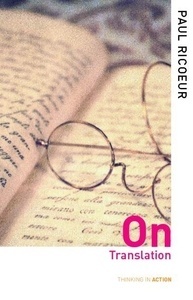On Translation

Editorial Routledge
Colección Thinking in Action, Número 0
Fecha de edición noviembre 2006
Idioma inglés
Traducción de Brennan, Eileen
EAN 9780415357784
72 páginas
Encuadernación en tapa blanda
Resumen del libro
Paul Ricoeur was one of the most important philosophers of the twentieth century. In this short and accessible book, he turns to a topic at the heart of much of his work: What is translation and why is it so important?
Reminding us that The Bible, the Koran, the Torah and the works of the great philosophers are often only ever read in translation, Ricoeur reminds us that translation not only spreads knowledge but can change its very meaning. In spite of these risk, he argues that in a climate of ethnic and religious conflict, the art and ethics of translation are invaluable.
Drawing on interesting examples such as the translation of early Greek philosophy during the Renaissance, the poetry of Paul Celan and the work of Hannah Arendt, he reflects not only on the challenges of translating one language into another but how one community speaks to another. Throughout, Ricoeur shows how to move through life is to navigate a world that requires translation itself.
Paul Ricoeur died in 2005. He was one of the great contemporary French philosophers and a leading figure in hermeneutics, psychoanalytic thought, literary theory and religion. His many books include Freud and Philosophy and Time and Narrative.
Biografía del autor
Nacido en Valence (Francia), fue profesor de Historia de la Filosofía en la Universidad de Estrasburgo (1948-1957) y profesor de Filosofía en la Universidad de la Sorbona (1957-1967), enseñando después en la Universidad de París-Nanterre hasta 1987. En 1970 pasó a formar parte del Departamento de Teología de la Universidad de Chicago. <br>La educación filosófica de Ric ur está vinculada desde muy temprano a los nombres de Husserl, Heidegger, Jaspers y Marcel. En 1939 fue hecho prisionero y pasó la guerra en diferentes campos de concentración. Este acontecimiento marcará su vida y su obra con una obsesiva interrogación sobre el problema del mal, la falta y el sufrimiento. Su compromiso religioso y su formación intelectual caminaron siempre juntos, pero dentro de una estricta división del trabajo: la exégesis bíblica, por un lado, y el quehacer filosófico, por otro.<br>Autor de una vasta y polifacética obra, su contribución a la elaboración y desarrollo de la teoría hermenéutica le convierte en uno de los artífices de lo que se conoce como el giro interpretativo de la filosofía . Entre sus numerosos títulos traducidos al castellano cabe destacar: La metáfora viva (2001); Caminos del reconocimiento (2005); Lo Justo 2 (2008); La memoria, la historia, el olvido (22010); Finitud y culpabilidad (22011), Amor y justicia (2011), En torno al psicoanálisis (2013) y Hermenéutica (2017), todos ellos publicados en esta misma Editorial.








